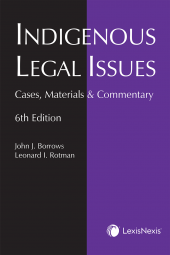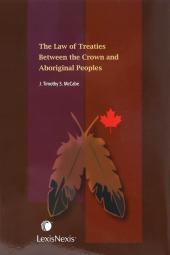 Aboriginal Law in Canada
by
Jack Woodward
Aboriginal Law in Canada
by
Jack Woodward
 Consolidated Aboriginal law statutes, Regulations, and Treaties.
by
Woodward, Jack
Consolidated Aboriginal law statutes, Regulations, and Treaties.
by
Woodward, Jack
 Aboriginal Law, Sixth Edition
by
Isaac, Thomas
Aboriginal Law, Sixth Edition
by
Isaac, Thomas
 Aboriginal law handbook, 5th ed
by
Olthuis, Kleer, Townshend
Aboriginal law handbook, 5th ed
by
Olthuis, Kleer, Townshend
 Indigenous legal issues : cases, materials & commentary
by
John J. Borrows, Leonard I. Rotman.
Indigenous legal issues : cases, materials & commentary
by
John J. Borrows, Leonard I. Rotman.
 Aboriginal tenure in the Constitution of Canada
by
James (Sakej) Youngblood Henderson, Isobel M. Findlay, Benjamin A. Ralston, Marjorie L. Benson.
Aboriginal tenure in the Constitution of Canada
by
James (Sakej) Youngblood Henderson, Isobel M. Findlay, Benjamin A. Ralston, Marjorie L. Benson.
 Aboriginal and Treaty Rights Practice
by
Mary Locke Macauley
Aboriginal and Treaty Rights Practice
by
Mary Locke Macauley
 Treaty rights in the Constitution of Canada
by
James (Sa ʾkeʾj) Youngblood Henderson.
Treaty rights in the Constitution of Canada
by
James (Sa ʾkeʾj) Youngblood Henderson.
 The law of treaties between the crown and Aboriginal Peoples
by
J. Timothy S. McCabe
The law of treaties between the crown and Aboriginal Peoples
by
J. Timothy S. McCabe
 Aboriginal and Treaty Rights in Canada
by
Michael Asch (Editor)
Aboriginal and Treaty Rights in Canada
by
Michael Asch (Editor)
E75-99 (History--Indians of North America)
KE7701-8199 (Law of Canada—Native peoples, Indians)
KF8201-8699 (Native groups)
